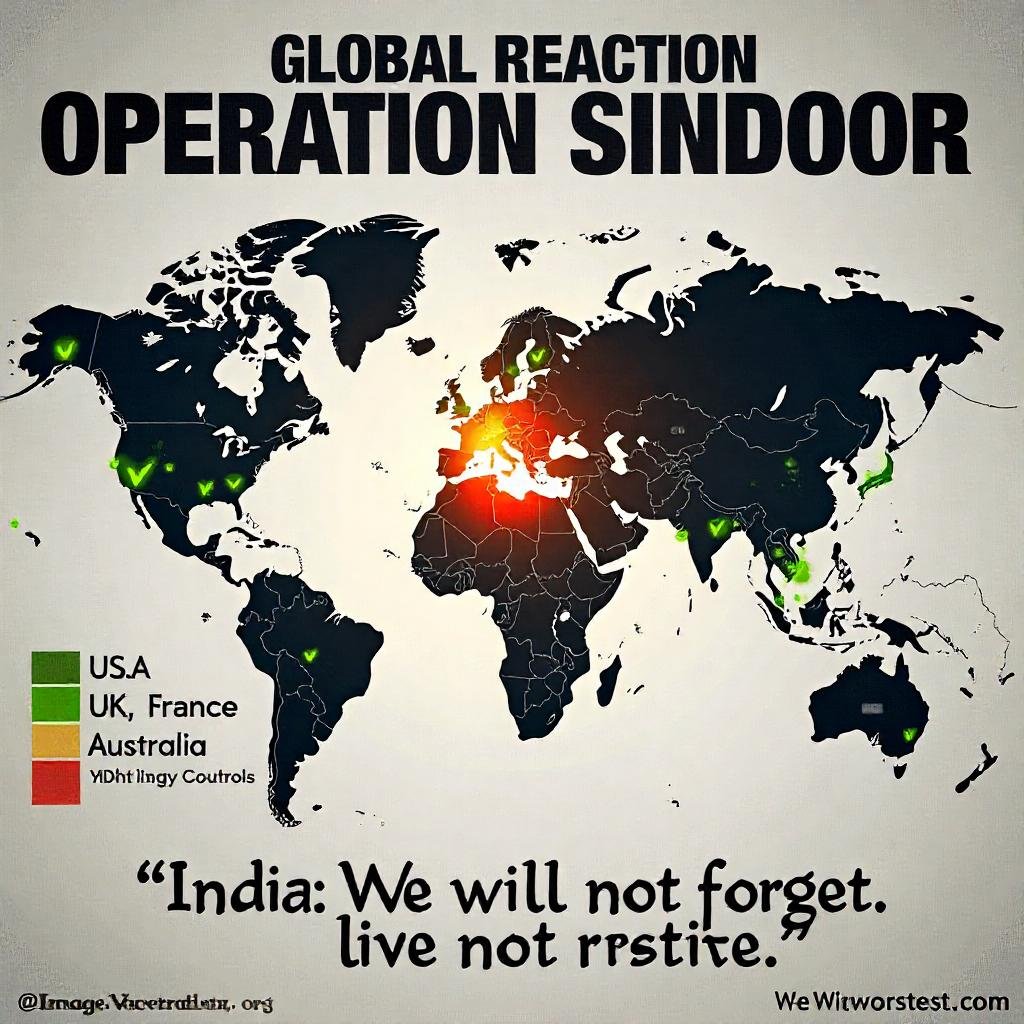Operation Sindoor: India Strikes Back After Pahalgam Terror Attack, Global Reactions Unfold
Following a horrific terror attack that rocked the tranquil Pahalgam valley in Jammu and Kashmir, India has initiated Operation Sindoor, a forceful military reaction. The onslaught has caused further tensions in the already tense relationship between India and Pakistan, as it was launched only days after the incident that killed 26 innocent civilians. Reactions have been quick and diverse as the world watches intently; most countries have condemned terrorism and are solidly in India’s corner, while a few have chosen to support Pakistan, further complicating the geopolitical situation.
The Pahalgam Tragedy
Pahalgam, a popular tourist destination renowned for its natural beauty and cultural significance, was the scene of the tragedy on an otherwise calm morning. 26 innocent people, including women and children, were killed when heavily armed extremists assaulted a caravan of civilian vehicles. Immediately linked to cross-border terrorist groups based in Pakistan and Pakistan-occupied Kashmir (PoK), the attack shocked the country and caused a great deal of grief and indignation.
Operation Sindoor, After the attack, Prime Minister Narendra Modi promised a firm and measured response in a televised speech. “We won’t forget. We’re not going to pardon. He declared, “Every drop of innocent blood will be avenged.”
Enter: Operation Sindoor
Operation Sindoor, a planned military action aimed at destroying terror infrastructure across the Line of Control (LoC), was approved by the Indian government as promised. The Indian military reportedly hit many terror launch pads and camps in the PoK as well as a few spots inside Pakistan, supported by satellite intelligence and on-the-ground observation. Although official figures have not yet been verified, preliminary reports indicate that at least three major terrorist organisations have suffered severe operational damage.
To commemorate the lives lost in the Pahalgam attack, particularly the women and children, the name Sindoor was chosen, representing the crimson vermillion worn by Indian women. The operation Sindoor is “precise, intelligence-driven, and aimed only at terror infrastructure, avoiding civilian zones wherever possible,” according to military sources.
Pakistan Retaliates
Pakistan’s reaction was predictably hostile. According to reports, the Pakistani military flew drones close to Indian airspace, some of which were shot down by the Indian Air Force, and carried out artillery strikes along a number of sectors of the Line of Control. While New Delhi insisted that the action was a preventative attack against terrorist elements rather than the Pakistani government, Islamabad denounced India’s move as a “violation of sovereignty.”
Tensions along the border have escalated as a result of this back and forth, prompting the deployment of more troops and increased vigilance along the LoC and international boundary. Schools in districts that are at risk have been temporarily closed, and residents of border towns on both sides have been urged to remain indoors.
World Reaction: Mostly With India
The majority of the world community has taken India’s position. The United States, France, Japan, Australia, and the United Kingdom are among the nations that have denounced the terror assault in Pahalgam and reiterated their support for India’s right to self-defence against terrorism.
Although it did not specifically name Pakistan, the UN also released a statement condemning the loss of innocent life and urging regional peace. Similar views were expressed by NATO members, who emphasised the necessity of eliminating safe havens for terrorists and reducing cross-border militancy.
According to U.S. Secretary of State Antony Blinken, “We stand with India in its fight against terror.” “There is no excuse for terrorism, and those who support it must answer for their actions.”
Turkey and Others Back Pakistan
But not every response was positive. Concern about India’s alleged “unilateral military aggression” was voiced by Pakistan’s long-time ally Turkey. Indian diplomatic circles criticised Turkish President Recep Tayyip Erdoğan for criticising “militaristic posturing” and stressing the importance of negotiation.
A few other countries, particularly some in the Gulf, have avoided outright denouncing the terror attack in favour of a more neutral posture or ambiguous statements calling for calm from “both sides.”
A New Chapter in Regional Dynamics?
The crisis could be a watershed in South Asian security dynamics as Operation Sindoor continues to play out and diplomatic tensions remain high. When it comes to combating terrorism, India’s strong posture indicates a change from passive diplomacy to a more active defence strategy.
The message from New Delhi is clear: India will no longer accept attacks on its territory without repercussions, even though war is still an undesirable result.
The Road Ahead
Both countries are currently on high alert. According to reports, backchannel diplomacy is underway, aided by international powers looking to reduce tensions. However, regional peace may remain precarious unless the causes of terrorism are tackled and countries come together to vigorously oppose those who support it.
The memory of Pahalgam lingers while the world watches and waits; it serves as a sobering reminder of the human cost of terrorism and a call for unyielding commitment in the face of it.
